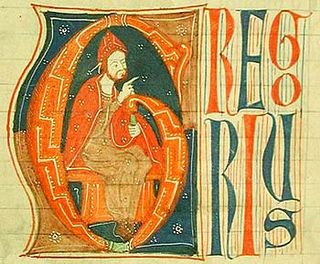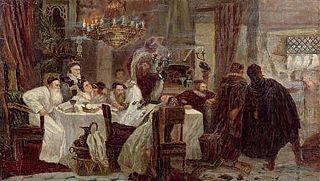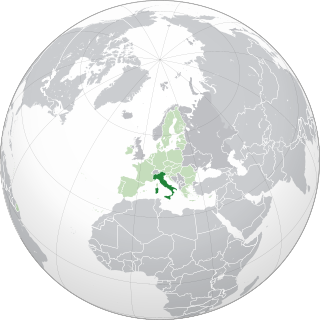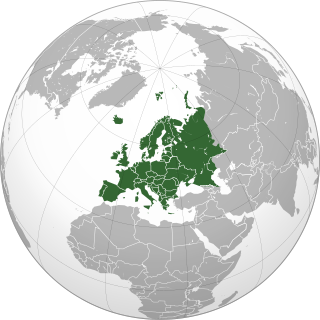Related Research Articles
Antisemitism in Christianity, a form of religious antisemitism, is the feeling of hostility which some Christian Churches, Christian groups, and ordinary Christians have toward the Jewish religion and the Jewish people.

The history of Christianity concerns the Christian religion, Christian countries, and the Christians with their various denominations, from the 1st century to the present. Christianity originated with the ministry of Jesus, a Jewish teacher and healer who proclaimed the imminent Kingdom of God and was crucified c. AD 30–33 in Jerusalem in the Roman province of Judea. His followers believe that, according to the Gospels, he was the Son of God and that he died for the forgiveness of sins and was raised from the dead and exalted by God, and will return soon at the inception of God's kingdom.

The Inquisition was a group of institutions within the Catholic Church whose aim was to combat heresy, conducting trials of suspected heretics. Studies of the records have found that the overwhelming majority of sentences consisted of penances, but convictions of unrepentant heresy were handed over to the secular courts, which generally resulted in execution or life imprisonment. The Inquisition had its start in the 12th-century Kingdom of France, with the aim of combating religious deviation, particularly among the Cathars and the Waldensians. The inquisitorial courts from this time until the mid-15th century are together known as the Medieval Inquisition. Other groups investigated during the Medieval Inquisition, which primarily took place in France and Italy, include the Spiritual Franciscans, the Hussites, and the Beguines. Beginning in the 1250s, inquisitors were generally chosen from members of the Dominican Order, replacing the earlier practice of using local clergy as judges.

Pope Gregory IX was head of the Catholic Church and ruler of the Papal States from 19 March 1227 until his death in 1241. He is known for issuing the Decretales and instituting the Papal Inquisition, in response to the failures of the episcopal inquisitions established during the time of Pope Lucius III, by means of the papal bull Ad abolendam, issued in 1184.

Marranos were Spanish and Portuguese Jews living in the Iberian Peninsula who converted or were forced to convert to Christianity during the Middle Ages, but continued to practice Judaism in secrecy.
Christian−Jewish reconciliation refers to the efforts that are being made to improve understanding and acceptance between Christians and Jews. There has been significant progress in reconciliation in recent years, in particular by the Catholic Church, but also by other Christian groups.

In the scholastic system of education of the Middle Ages, disputations offered a formalized method of debate designed to uncover and establish truths in theology and in sciences. Fixed rules governed the process: they demanded dependence on traditional written authorities and the thorough understanding of each argument on each side.

The Council of Vienne was the fifteenth ecumenical council of the Catholic Church and met between 1311 and 1312 in Vienne, France. One of its principal acts was to withdraw papal support for the Knights Templar at the instigation of Philip IV of France. The Council, unable to decide on a course of action, tabled the discussion. In March 1312 Philip arrived and pressured the Council and Clement to act. Clement passed papal bulls dissolving the Templar Order, confiscating their lands, and labeling them heretics.
History of European Jews in the Middle Ages covers Jewish history in the period from the 5th to the 15th century. During the course of this period, the Jewish population gradually shifted from their homeland in the Levant to Europe, primarily Central Europe dominated by the Holy Roman Empire or Southern Europe dominated by the Iberian kingdoms.

The history of the Jews in Italy spans more than two thousand years to the present. The Jewish presence in Italy dates to the pre-Christian Roman period and has continued, despite periods of extreme persecution and expulsions, until the present. As of 2019, the estimated core Jewish population in Italy numbers around 45,000.

The Catholic Church and Judaism have a long and complex history of cooperation and conflict, and have had a strained relationship throughout history, with periods of persecution, violence and discrimination directed towards Jews by Christians, particularly during the Middle Ages.

The Disputation of Tortosa was one of the famous ordered disputations between Christians and Jews of the Middle Ages, held in the years 1413–1414 in the city of Tortosa, Catalonia, Crown of Aragon. According to the Jewish Encyclopedia it was not a free and authentic debate, but was an attempt by Christians to force conversion on the Jews.

The history of the Jews in Europe spans a period of over two thousand years. Some Jews, a Judaean tribe from the Levant, migrated to Europe just before the rise of the Roman Empire. Although Alexandrian Jews had already migrated to Rome, a notable early event in the history of the Jews in the Roman Empire was the 63 BCE siege of Jerusalem.

The history of Christian thought has included concepts of both inclusivity and exclusivity from its beginnings, that have been understood and applied differently in different ages, and have led to practices of both persecution and toleration. Early Christian thought established Christian identity, defined heresy, separated itself from polytheism and Judaism and invented supersessionism. In the centuries after Christianity became the official religion of Rome, some scholars say Christianity became a persecuting religion. Others say the change to Christian leadership did not cause a persecution of pagans, and that what little violence occurred was primarily directed at non-orthodox Christians.
Pablo Christiani was a Sephardic Jew who, having converted to Christianity, used his position as a Dominican friar to endeavor to convert other Jews in Europe to Roman Catholicism.
Antisemitism in the history of the Jews in the Middle Ages became increasingly prevalent in the Late Middle Ages. Early instances of pogroms against Jews are recorded in the context of the First Crusade. Expulsions of Jews from cities and instances of blood libel became increasingly common from the 13th to the 15th century. This trend only peaked after the end of the medieval period, and it only subsided with Jewish emancipation in the late 18th and 19th centuries.
This timeline of antisemitism chronicles events in the history of antisemitism, hostile actions or discrimination against Jews as members of a religious and/or ethnic group. It includes events in Jewish history and the history of antisemitic thought, actions which were undertaken in order to counter antisemitism or alleviate its effects, and events that affected the prevalence of antisemitism in later years. The history of antisemitism can be traced from ancient times to the present day.

Heresy is any belief or theory that is strongly at variance with established beliefs or customs, in particular the accepted beliefs of a church or religious organization. The term is usually used in reference to violations of important religious teachings, but is also used of views strongly opposed to any generally accepted ideas. A heretic is a proponent of heresy.

The persecution of Jews during the Black Death consisted of a series of violent mass attacks and massacres. Jewish communities were falsely blamed for outbreaks of the Black Death in Europe. From 1348 to 1351, acts of violence were committed in Toulon, Barcelona, Erfurt, Basel, Frankfurt, Strasbourg and elsewhere. The persecutions led to a large migration of Jews to the Kingdom of Poland and the Grand Duchy of Lithuania. There are very few Jewish sources on Jewish massacres during the Plague.
Cum saepe accidere was a papal bull issued by Pope Clement VIII on 28 February 1592, which decreed that the Jews of Avignon were forbidden to trade "new commodities" in public places in order to put them at an economic disadvantage.
References
- ↑ Solomon Grayzel of Encyclopaedia Judaica - Jewish Virtual Library The Gale Group 2008 (American-Israeli Cooperative Enterprise) [Retrieved 2015-07-20]
- ↑ Emily Taitz - The Jews of Medieval France: The Community of Champagne, Volume 1944 Issue 45 of Contributions to the study of world history - The Jews of Medieval France: The Community of Champagne Greenwood Publishing Group 1 Jan 1994, 340 pages, ISBN 031329318X [Retrieved 2015-07-20]